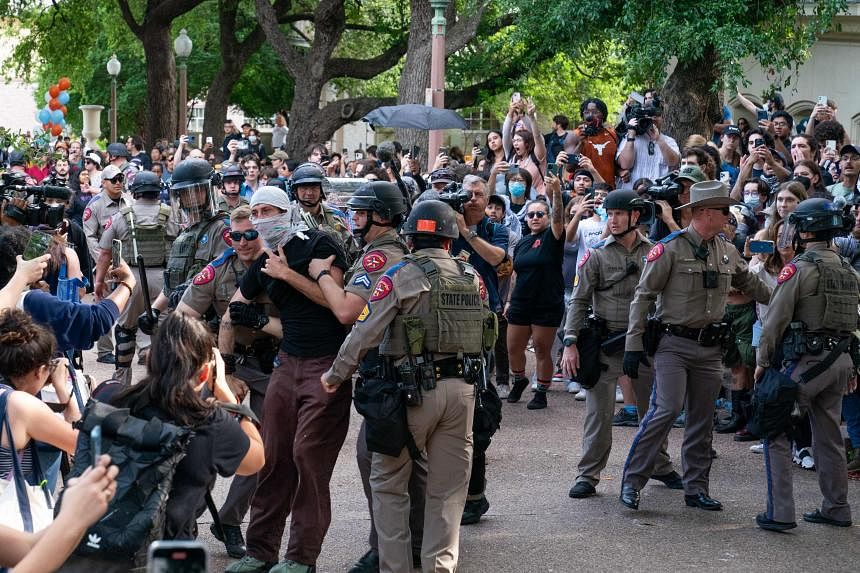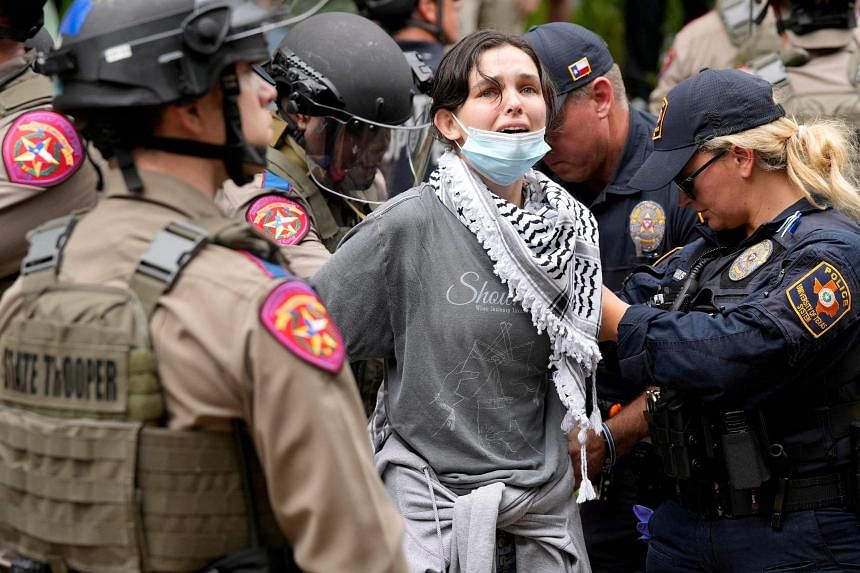NEW YORK – A wave of pro-Palestinian protests spread and intensified on April 24 as students gathered on campuses around the US, in some cases facing off with the police, in a widening showdown over campus speech and the war in the Gaza Strip.
University administrators from Texas to California moved to clear protesters and prevent encampments from taking hold on their own campuses as they have at Columbia University, deploying the police in tense new confrontations that already have led to dozens of arrests.
At the same time, new protests continued erupting in places such as Pittsburgh and San Antonio.
Students expressed solidarity with their fellow students at Columbia, and with a pro-Palestinian movement that appeared to be galvanised by the pushback on other campuses and the looming end of the academic year.
Protesters on several campuses said their demands included divestment by their universities from companies connected to the Israeli military campaign in Gaza, disclosure of those and other investments, and a recognition of the continuing right to protest without punishment.
The demonstrations spread overseas as well, with students on campuses in Cairo, Paris and Sydney gathering to voice support for Palestinians and opposition to the war.
As new protests were emerging, House of Representatives Speaker Mike Johnson visited the Columbia campus in New York, where university officials were seeking to negotiate with protest leaders to end the encampment of around 80 tents still pitched on a central campus lawn.
Mr Johnson said Professor Nemat Shafik, the school’s president, should resign if she could not immediately get the situation under control, calling her an “inept leader” who had failed to guarantee the safety of Jewish students.
The Speaker said there could be an appropriate time for the National Guard to be called in, and that Congress should consider revoking federal funding if universities could not keep the protests under control.
Republican lawmakers have accused university administrators for months of not doing enough to protect Jewish students on college campuses, seizing on an issue that has sharply divided Democrats.
Some of the campus demonstrations that have taken place since the war began in 2023 have included hate speech and expressions of support for Hamas, the armed group based in Gaza that led the deadly attack on Israel on Oct 7, 2023, that killed nearly 1,200 and saw around 250 others abducted as hostages.
The Israeli retaliation to the attack has left more than 34,000 people dead in Gaza, most of them women and children.
One of the biggest new protests on April 25 was in Texas, where dozens of police officers, many of them in riot gear and some of them on horseback, blocked the path of protesters at the state’s premier public university, the University of Texas at Austin. At least 34 people were arrested after refusing to disperse, according to a state police spokesperson.
Governor Greg Abbott said arrests there would continue until the protesters dispersed.
“These protesters belong in jail,” he wrote on the social media platform X. “Students joining in hate-filled, anti-Semitic protests at any public college or university in Texas should be expelled.”
Hours earlier, at the Dallas campus of the University of Texas, a large group of student protesters briefly staged a sit-in near the office of the university president, demanding divestments. The students left after the president agreed to meet them.
At the University of Southern California (USC) in Los Angeles, the police moved in just before lunchtime to break up an encampment of about 100 pro-Palestinian protesters at the centre of campus.
As demonstrators chanted “shame”, officers tackled at least one protester and put that person into a campus police car, but the protester was later released.
Many USC students were angered at the cancellation of a commencement address by valedictorian Asna Tabassum, who is Muslim, after complaints from groups on campus that cited her support on social media for Palestinians.
Just before 6pm local time, Los Angeles Police Department officers ordered protesters to disperse and threatened them with arrest and expulsion from school. Officers ultimately arrested 93 people for trespassing and one person on suspicion of assault with a deadly weapon.
At Brown University on Rhode Island, scores of students pitched tents on the campus’ Main Green on April 24.
Organisers said their minds were on the children and students in Gaza, not on the administration’s warning that the new encampment violated university policy. They promised to stay until they were forced off.
Administrators at Harvard University sought to head off a similar scene by shuttering Harvard Yard, a central gathering place on campus.
But students flooded the yard’s grassy patches anyway on April 24, rapidly erecting tents as part of an “emergency rally” against the suspension of a pro-Palestinian campus group.
Late on April 23, two students were arrested at Ohio State University, school officials said, during an on-campus protest that had since dispersed.
The protests at the University of Texas at Austin were among the first to take place in a Republican-led state in the South, occurring within walking distance of the governor’s mansion.
Like other Republican political leaders, Mr Abbott has been outspoken in his support for Israel, and in March, vowed to fight any anti-Semitism on campus.
State police were deployed to the campus on April 24 at the request of the university and at Mr Abbott’s direction, said state police spokeswoman Ericka Miller, “in order to prevent any unlawful assembly”.
When protesters began to congregate despite the warnings, the response was swift. Scores of officers formed crowd-control lines, some clutching batons. After having ordered the protesters to disperse, some officers surged into the crowd and hauled several people away, then returned for others.
At one point, hundreds of students and their supporters were gathered on the south mall of the campus, including some who gathered in a large circle and chanted: “Pigs go home!”
Soon, the police moved in again, pushing through the crowds and making further arrests. Ms Miller said the majority of those arrested were charged with criminal trespassing. NYTIMES


